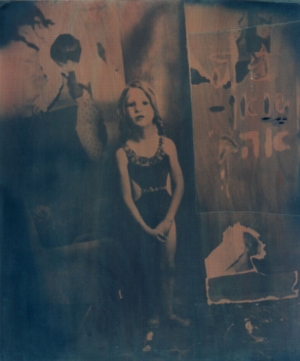 February 08
February 08
Lech Lecha, or: How Israeli Jews Find Renewal in Diaspora
David Gottlieb
 Awakening late to my Judaism--as so many American Jews do--I came to a realization both strange and wonderful: there are Israelis in my midst! At last, I thought, : Real Jews! Jews who've fought and sweated and sacrificed for the realization of that fevered, millennial dream: the Jewish State! Jews who speak Hebrew! Jews who live and breathe their Judaism!
Awakening late to my Judaism--as so many American Jews do--I came to a realization both strange and wonderful: there are Israelis in my midst! At last, I thought, : Real Jews! Jews who've fought and sweated and sacrificed for the realization of that fevered, millennial dream: the Jewish State! Jews who speak Hebrew! Jews who live and breathe their Judaism!
But wait: if living in Israel is living the Jewish dream… why are so many Israelis living here?
A recent trip to Israel, and two days of meetings with Israelis in which we discussed (and heard a panel discussion on) this topic, made me wonder whether perhaps in Israel Judaism is breathed more than lived. Could it be that life in Israel is just too hard, too complicated, too angry, too fractious? Or is it so easy to be a Jew in Israel that you stop practicing Judaism?
Does Israel Need Diaspora?
As a participant in the Wexner Heritage Program (a two-year Jewish leadership development program run by the Wexner Foundation), I traveled to Israel this past summer with more than 100 other participants and their spouses. We came from six U.S. cities to see aspects of life in Israel that most Americans don't see, including an ultra-Orthodox community (where members of our group who attempted to visit a yeshiva were pelted with kugel by angrily protective community members); a West Bank settlement; Bethlehem and other Palestinian communities bordered or split by the security barrier; a religious leader in the Muslim quarter of the Old City; and Kibbutz Nir Am near the Erez border crossing into Gaza, to name a few.
As eye-opening as those experiences were, we learned more about Judaism in Israel from spending the better part of two days in animated conversation with Israeli alumni of the Wexner Israel Fellowship program. These are Israelis working in the public sector whom the Wexner Foundation treated to a year at the Kennedy School of Public Policy at Harvard University. In exchange for this year, during which the participants earned Masters degrees in Public Policy, the participants committed to spending at least another three years working in Israel's public sector. They are judges, health care administrators, mayors, high-level police commanders--professionals who know life in Israel and are committed to it, but who predominantly (it turns out) feel little connection to Jewish spiritual practice.
As part of a two-day mifgash, the American visitors were sorted into groups with our Israeli counterparts. We were asked to discuss the nature of Jewish identity and practice, and how Israeli and American Jews could overcome barriers to work together more effectively to strengthen Israel.
The Americans in my group watched as the Israelis engaged in heated debate about whether it is a Jew's obligation to live in Israel. One Israeli--a former small-town mayor--frowningly asserted that it was and is our solemn duty to make aliyah. He could see no reason why a Jew would choose to live anywhere else, or how in good conscience a Jew could even make such a choice.
This gentleman was immediately set upon by fellow Israelis who said Israel wouldn't be on the map if it weren't for Diaspora Jews, and that Israel needs us to be right where we are, supporting Israel with our dollars, yes, but also our hearts, our minds--and our Jewish practice.
This was where the discussion really surprised the Americans in our group. One Israeli explained his work to bring more Jewish education to Israeli public schools--a task fraught with politics and met with much suspicion and bureaucratic resistance. Religious observance in Israel, he said, is seen as the province of the ultra-Orthodox, and is therefore met with increasing distrust and cynicism in Israel's steadily secularizing society.
One woman said that on the High Holidays it is the custom of many Israelis to go to synagogue but to stand outside for the duration of the service.
Why? the Americans in our group asked all at once.
"We're not comfortable inside," she said. "It seems alien to us. We know we belong there, and we belong together, so we go. But inside it's a whole different story. We belong together, but inside we don't belong so much."
Israelis: At Home in Diaspora?
On the other hand, here in the Midwest, my Israeli neighbors seem not just numerous but comfortable in Diaspora. They are leaders in Jewish education, in synagogue life, in Israeli charitable work, and in their professions.
Their children are at ease in English and in Hebrew, at home in the U.S. or Israel--and they know their way around a siddur. For all their easy familiarity with two cultures, perhaps these hybridized Israeli-Americans never feel entirely at home; perhaps a Jew never does. But the American children of Israelis, among whom I count two step-daughters and three nieces, seem to me more comfortably Jewish--that is, comfortable as Jews both cultural and spiritual, more adaptable and less alienated--than their fully Israeli counterparts.
Of course, it's not all milk and honey on this side of the Atlantic. Recent studies show that the American Jewish population is shrinking, in large part because an estimated 54% of American Jewish children are being raised with no Jewish observance or education. Even if that ratio doesn't apply to the roughly half million Israelis living in the U.S., or to the 15-25,000 Israelis living in the Chicago area, the relentless pull of assimilation is surely felt. (Anti-Semitism--assimilation's bastard brother--is also more than just a concept or a memory here: subtle though it may often be, no Jew who lives in America doesn't experience it.) Still, my Israeli friends and neighbors infuse their lives here with Jewish practice and spiritual meaning in a way that seemed foreign to the Israelis they left behind.
Israeli Jews in America come here for jobs or for study; they stay for the chance to do well for themselves and their children. Not feeling entirely at home at first, newly arrived Israelis seek each other out in the places where Jews gather: in synagogues, at Jewish day schools, in the homes of other Israelis. And in so doing, they become strong threads in a Jewish fabric that is, in my little corner of the world, Jewishly literate, spiritually observant, proudly American -- and deeply concerned for, and invested in, the future of Israel.
We don't query our Israeli friends about their “reverse aliyah”: after all, we're here, too, and we feel a little guilty about it. The Torah commandment to "clear out the land and settle in it" (Numbers 33:53) is a clear directive to live in Eretz Israel--a commandment that is (according to Midrash) equivalent to all other mitzvot combined.
We comfort ourselves with Jewish sources that justify our staying in Diaspora. Kabbalistic sources, for example, contend that Jews in Diaspora are dispersed because it is our task to reveal holy sparks to the nations.
Bringing Jewish Light
Ironically, maybe the Kabbalists were right. Here in Diaspora we're constantly beckoned by the sirens of assimilation. Perhaps having to resist assimilation's allure builds our spiritual strength. As some of us in Diaspora turn anew toward Judaism's spiritual content, we wonder if our Judaism could survive in Israel. Can Israel's Judaism survive the messiness of Israeli politics, the cynicism engendered by ultra-Orthodox spiritual hegemony, and the ruthless pressure of being hemmed in by neighbors bent on the state's destruction?
I'm always thrilled by how easy it is for Israelis to be harshly critical and ruthlessly introspective, but I wonder if that thrilling Israeli bluntness isn't turning cannibalistic. In an interview last summer in Haaretz, Avram Burg asserted that Israel cannot continue to exist as a Jewish state -- indeed, that it isn't now a Jewish state, may never have been one, and certainly won't be one in the future. He is bleak on Israel's future because he believes it is built on Herzl's reactive Zionism, instead of Ahad Ha'am's goal to realize spiritual independence. Burg says that because of this, his Israeliness undermines his Judaism: "Of the three identities that form me -- human, Jewish and Israeli -- I feel that the Israeli element deprives the other two."
An Israeli friend of mine--I'll call him Gili--thinks most Israelis see themselves as Israeli first and Jewish second. But he thinks Burg is onto something: "If we're a Jewish state, we have to be ohr la goyim, a light to the nations," Gili says. "But we're not." Even so, a Jew who never lives in Israel, he says, will never realize Judaism's full expression: to be not just practiced but lived; to be freed from the confines of the synagogue and the community center, and to be alive in the open air, unscorned and unscrutinized, enveloped in a kind of everyday holiness.
Gili, who has lived in America for almost twenty-five years, has done well here. He supports Israeli charitable causes and travels frequently to Israel -- and he gets frustrated every time. While he loves the land, the country is a mess. Israelis, says Gili, are arrogant but incompetent, haughty and yet corrupt. Nothing works as it should.
I wish he had met the Israelis I met at the Wexner mifgash. These people are capable of anything. They are proud of their Judaism and committed to Israel. They've spent a year in the States, and taken what they've learned from a very good university (and its vibrant Jewish community) back home with them.
Such people might even restore the faith of an Avram Burg.
But if not, perhaps some time in Diaspora would be refreshing. I've got a spare bedroom in the basement, Avram. You're welcome anytime.
David Gottlieb is a developer of affordable housing, a writer, a participant in the Wexner Heritage Program and a member of Moriah Congregation, a Conservative synagogue in Deerfield, Illinois. He is co-author, with Rabbi Akiva Tatz, of Letters to a Buddhist Jew, and writes regularly about Judaism, meditation, baseball and other passions on his blog, True Ancestor.










